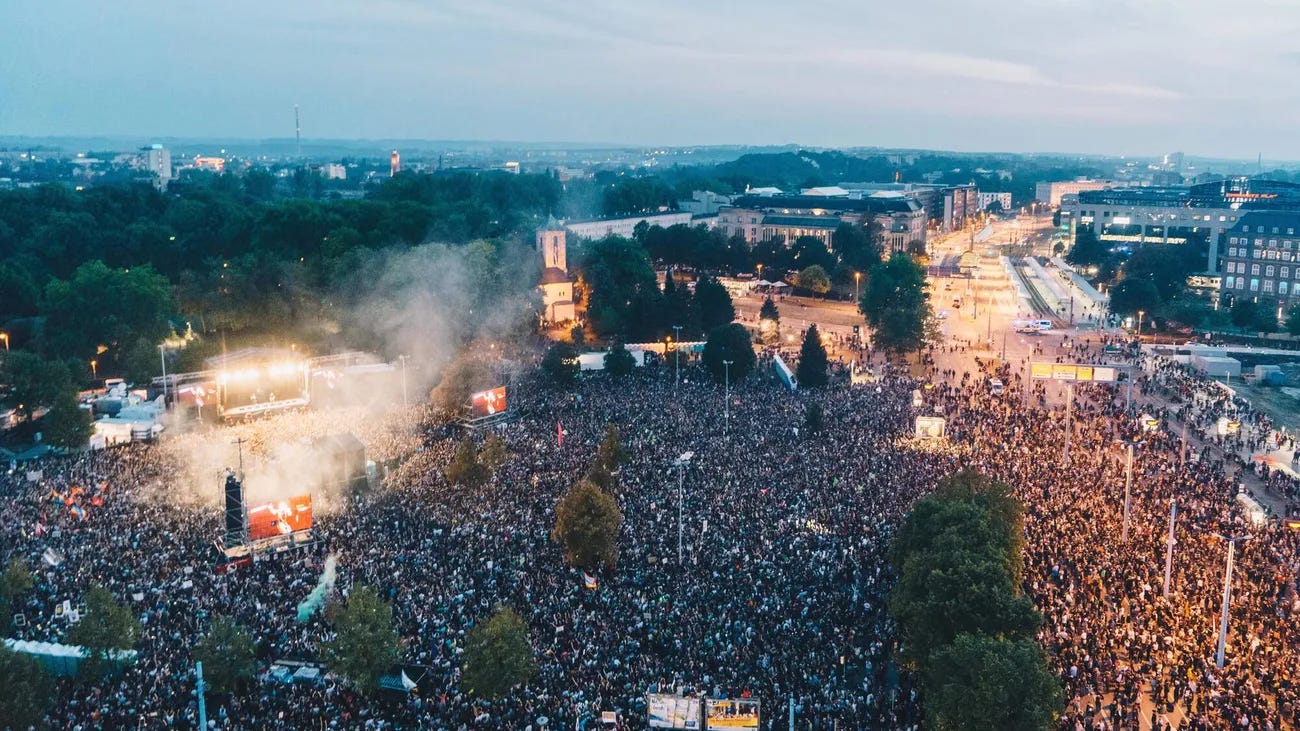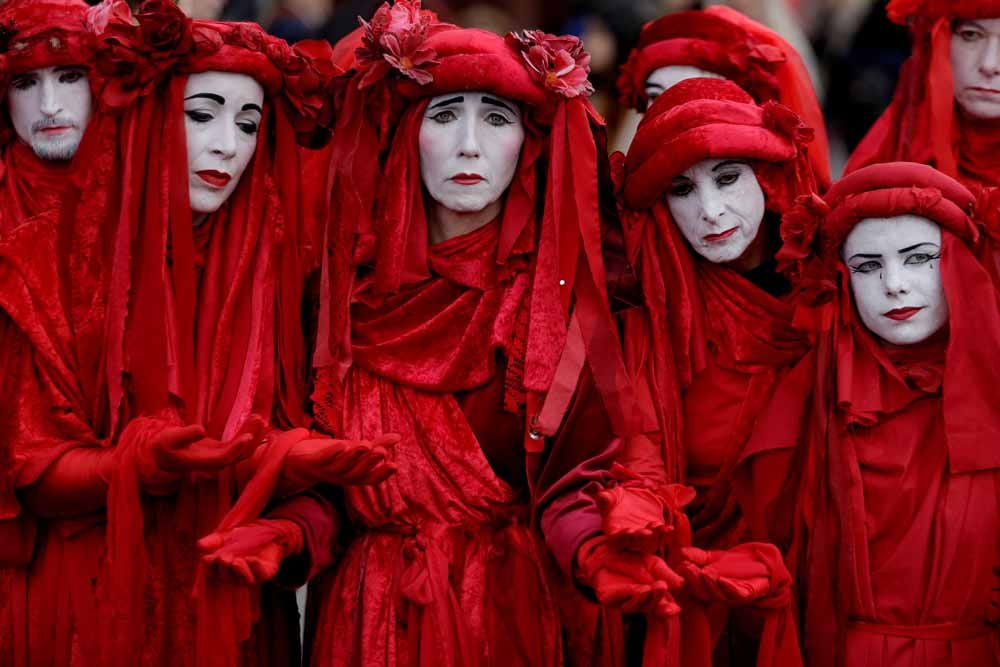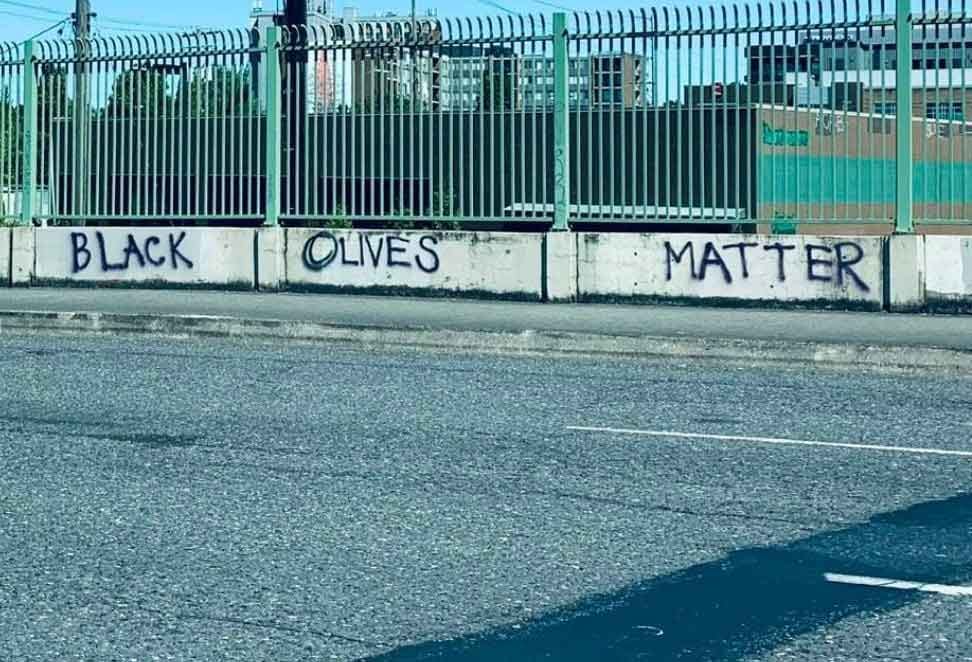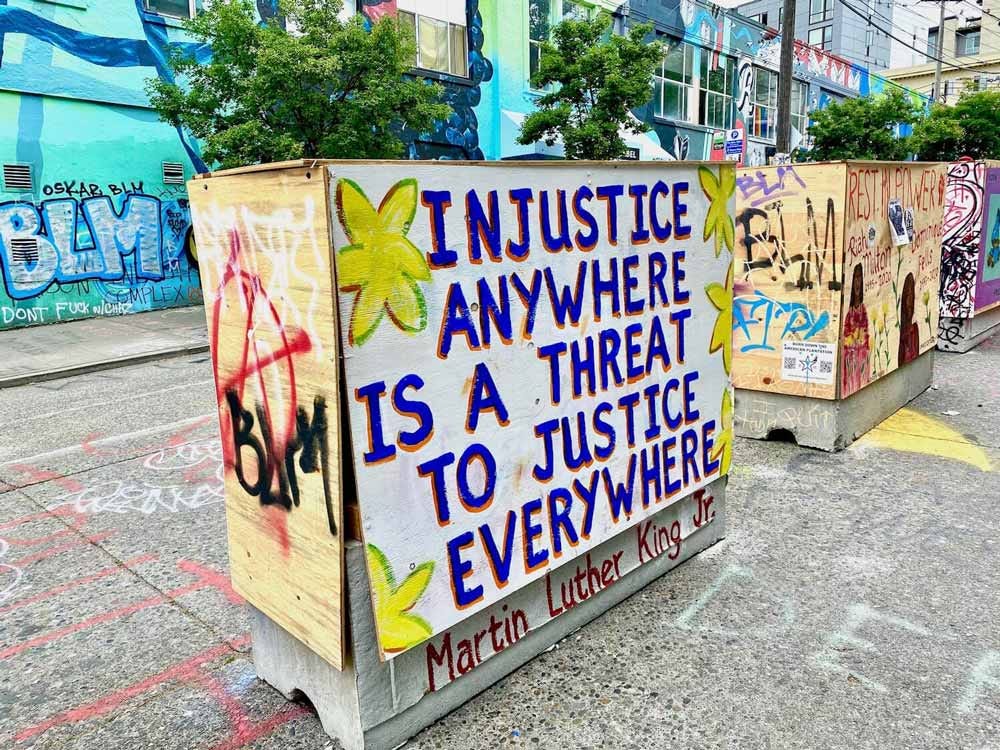The Leftist Notion of Rebellion
In March 2025, über-woke TV writer/producer Russell T Davies spoke at the “Gaydio Pride Awards”. In a rabble-rousing speech, the 61 year-old said:
I think times are darkening beyond all measure, beyond anything I have seen in my lifetime. The threat from America - it’s like something out of Lord of the Rings! It’s like an evil rising in the West. And it is evil.
We’ve had bad prime ministers before. We’ve had bad presidents before. [unintelligible] What we’ve never had before is a billionaire tech baron, unelected, openly hating his trans daughter. We have never had this in the history of the world. It is terrifying, because he and the people like him are in control of the facts. They are in control of information. They are in control of what people think. And that is what we are now facing.
However, he was optimistic about how marginalised but plucky gays will defeat a bigoted establishment:
But do you know what we’ll do? You know what we always do in times of peril and crisis?
We gather. And we meet in cellars at night, and we talk, and we plot, and we sing, and we paint, and we manifest ideas. We go on marches, we do [petitions], we attack, we talk to politicians, we organise ourselves. In the end what we do is we educate. We take everything we know and we go out there and we educate.
It’s a cosy idea. The setting - cellars at night - is so cute, you just know this man has never been an actual rebel, trying to change the world from a position of weakness. He has never been so unfortunate as to have to actually “speak truth to power”. The power, even if veiled, was always on his side.
However, you can see why he wants to believe it. The idea bolsters the typical leftist self-image:
brave
oppressed
resourceful
creative
sensitive
peaceful
intelligent (able to persuade politicians)
enlightened and wise
educators of the masses
Davies gave this speech shortly before a TV drama he had written over a year earlier was broadcast. Clearly these thoughts had been in his head for some time, because the drama featured a scene closely matching his description:
The disabled, the trans, the gay… the “non-conformists”, the ones who “don’t fit in”, the ones who “think differently”… they gather in a (pristine, well-lit, well-organised and very spacious) cellar, where they inspire each other with song, dance, painting and performance. Because this is how change happens, right?
Davies’ description of “changing the world” was so perfect in its naivety, it revived thoughts I have had for some time about where this notion came from. How did leftists get it into their heads that they had changed the world with “ideas”, not sheer financial and political strength?
Let’s go through some historical precedents, “moments” that probably contributed to this archetype of joyous leftist rebellion.
1900s-1910s: Russian Communist émigrés
Lenin and many colleagues lived in exile in dingy boarding houses around Europe.
They were not “singing” or “painting”. They were certainly plotting, but their plotting was based on a ruthlessly realistic understanding of power - real power, not “the power of ideas”. They had no intention, and saw no need, to “educate” the masses or “petition” the powerful. With huge financial backing from Wall Street, they were going to take over the government, murder the Tsar and his family, seize power by force, then use it to impose their vision on the masses with ungodly brutality. Millions of people would be murdered. As Lenin (supposedly) said:
If for the sake of Communism it is necessary for us to destroy 9/10ths of the people, we must not hesitate.
There would be no educating, no persuading. The masses would be terrorised until they either submitted or were dead. Sensitive? Wise? Enlightened? Peaceful?
We needn’t discuss the implementing of other Communist regimes. They were all the same as this.
1900s-1910s: Bohemian circles in London
This is probably closest to what Davies was describing. In the years around World War I, “Bohemian” groups in London would meet in artist colonies, galleries and drawing rooms to discuss ideas, play music and share art, and generally “be creative”.
It was implicitly and stridently progressive yet not doctrinally so, because the doctrines had not yet been written. This left room for creativity and wandering. This was the London of EM Forster and Lytton Strachey, the Bloomsbury Group and the Fabian Society, but also of Wyndham Lewis, Ezra Pound, TS Eliot, the Vorticists and the Theosophists. Reactionaries brushed alongside progressives because neither side was “on top”.
However, to focus on the progressives (since Davies would never laud reactionary politics), it has to be noted that they didn’t have a manifesto or a party or a plan, made no political demands, and didn’t achieve anything concrete in terms of changing the world. It was not political activism. You might call it metapolitics - laying cultural groundwork for later political change.
It is also vital to note that, unlike Davies’ notion of political rebellion, these people were fully accepted by the mainstream and “the establishment” even while they strayed from its beliefs. They were not oppressed. This is why they lived in comfort and decadence, and had the freedom to “sing”, “paint” and “manifest ideas” etc.
1960s New York City
When Camille Paglia champions “that ‘60s spirit”, she is probably thinking at least partly about NYC. At that time there was much less wealth in the city than today, so it was possible for poor artists to rent or even buy large loft spaces, for budding entrepreneurs to open off-beat cafes, and for people to live there and frequent these places without being millionaires.
There is no doubt that, in the spheres of music, literature and art, 1960s NYC was a bustling hothouse. Was it political, as Davies espouses? Some of it certainly was (I’m thinking of the feminist and gay activism) but most of it was simply creative and decadent. Lenin and his émigré chums achieved actual political action because they were anything but decadent; they had drive, focus and relentless determination. And of course, they had elite backing. In 1960s NYC, the latter was also true. Record labels and publishing houses were expressly cultivating the underground, the controversial and the leftfield. As for the art world, it was pouring cash into the outré, the avant-garde and the bewildering. The epitome of this would be Andy Warhol with his “Factory”, peopled by an assortment of creatives, degenerates, oddballs and nutcases.
This was not political activism as such, like Davies raves about. It was metapolitical, and (almost as if mainstream politics had become irrelevant by the 1960s) it had definite social, cultural and political consequences. This is why, many decades later, people often say that we are still living in the aftermath of the 1960s.
The important thing is that all of this was, for sure, pushed from above.
1969: Woodstock
Similarly, Woodstock was a creative phenomenon that had metapolitical effects. Unlike Andy Warhol’s Factory, it has the reputation of being spontaneous, organic, grass-roots, etc. This is untrue. It was organised by elite, well-connected Jews who, in a newspaper ad asking for business ideas, described themselves as “young men with unlimited capital”.
It certainly was counter-cultural and subversive, but against a culture that was already largely defeated and certainly didn’t have “unlimited capital” with which to defend itself, let alone the organisational potential or the clear-eyed determination of that force which was now openly opposing it.
1980s: feminist and gay pride marches
Davies had personal experience of this as a young adult, having taken part in gay activism in the 1980s. Yet, I don’t think he was reminiscing about this when he said his jubilant words at Gaydio. Perhaps he remembers it that way, but I am dubious. British gay men, of his age, tend to be in love with the late Victorian and Edwardian demimonde, Bohemian edginess flirting with high society, decadence and debauchery, marriages of “convenience”, cottaging, cafés frequented by theatrical types, eccentric “fag hags” and talented and forthright young men. It is the world of Oscar Wilde, living on in eternal oppression, bravery, aristocratic erudition and learned wit… even a century after the oppression has ended, the education dumbed down, and the erudition long since given way to Guardian midwittery - credibility bought with a spice latte. I wouldn’t be surprised if Davies transposes the glamorous Edwardian “ideal” onto his personal memories of a bunch of middle-brow gay guys in a pub in 1985.
However, no matter the erudition of his comrades, it can certainly be said that they were not “open-minded” in the manner that he celebrates. By 1985 that had been replaced by doctrine. I also think it is increasingly clear now, to ordinary people, that any “education” these activists had to offer the masses - whether on gay rights or feminism - was misguided at best and malicious at worst.
Moreover, they certainly were not “plotting”. They didn’t need to. By 1985 the powerful were on their side, even if still clandestinely. Cinema and TV were depicting gay people freely, and feminism was thoroughly embedded in everyday life. These things had already been selected, at a very high level, and the likes of Davies were merely pawns to implement it “on the ground”. They were pushing at an open door, even if they sincerely believed they were oppressed rebels.
I would be amazed if Davies has ever been in a situation such as he described. If his own words are to be believed, gay men face greater threat in 2025 than he and his friends did in 1985.
2010: Occupy
Occupy was not what Davies described, but it was left-wing and, at least apparently, organic. There are unconfirmed rumours that George Soros funded it to some extent, but I don’t believe this. I think it was a grass-roots movement and therefore quite shambolic. And of course, it didn’t achieve its aims. What did happen, either in response to Occupy or because Soros was indeed using it as a prototype, is that the corporate world started massively funding left-wing activism, in order to get such people in line with globalism and corporatism. This eventually got to the point where so-called anarchists were defending global capitalism, corporate censorship, state oppression, and government-imposed lockdowns.
2010s “wokery”
Virtually any left-wing movement that flourished in the 2010s probably had funding from Big Capital or powerful NGOs.
The Left (and yes I dare to make such a blanket statement) were happy to support all sorts of things as long as they were done by people who professed agreement with them on all social issues: feminism, immigration, diversity, abortion, childlessness, gay rights, trans, and “safety” (eg. from covid or from “hate speech”). Meantime, Big Capital was happy to profess agreement with the Left on all these issues, because this made them obedient.
Thus, we saw freedom of speech, freedom of inquiry and freedom of association being trampled by the powerful while their actions were defended by “the open-minded Left”. We saw blatant contradictions being argued by the “intelligent and educated” Left. We saw hellish injustices being excused by the “more moral” Left.
It was an appalling spectacle because it demonstrated the power of, well, power. It can contort people so that they will contradict themselves, defend the indefensible and believe the unbelievable.
2018: Greta Thunberg
This one is too easy.
Let me first make the concession that Greta Thunberg is not the decadent sort of activist that Davies described. I cannot imagine her being open-minded enough to “talk” in a relaxed way and “manifest ideas”. If she sings or paints, it will be for therapeutic rather than creative or social reasons.
Greta became a global figure overnight because she had elite backing; her wealthy parents had been climate campaigners for a long time and were in touch with various media moguls.
To underline: when you are getting glowing cover stories in Time Magazine and GQ, you are not counter-cultural, you are not “speaking truth to power”, and you are certainly not oppressed.
For years, she had prominence and prestige and was worshipped for intoning, as if either wise or learned, about climate change and what we all must do to combat it.
When she did something the elite didn’t like, however, they instantly transformed her into a mocked irrelevance.
2018: Chemnitz concert
This is a truly grotesque inversion of “protest”, a mockery of “people power”, since it was entirely organised from above - not merely astroturfed but wholly created by the powerful.
In the East German city of Chemnitz, a migrant killed a German, Daniel Hillig. Anti-migrant protests erupted, outnumbering the leftist counter protests. Concerned this might sway the public, the city organised a rock concert against racism. The goal was to lull the masses back to sleep and intimidate the Right into silence by weight of sheer numbers.
Hillig’s body was hardly cold when thousands of leftists, having been bussed in from around Germany to manufacture the crowds, danced and cheered to far-left rappers, on a stage financed by Big Capital and broadcast by 11 different radio stations and a mainstream TV channel. The truth not only didn’t matter, it was being actively buried. Educating? Enlightening? Oppressed? Speaking truth to power? Laughable.
2018: Extinction Rebellion
While claiming to be a grass-roots movement, this had funding from “major donors, NGO’s, trusts and foundations”. This explains how spruce and well-resourced it all was, with professional placards, highly-organised demos and even well-crafted bespoke costumes and make-up.
There are two points to make about this movement.
First, it was not the decadent bohemian set-up that Davies enthused about, but a very 2010s creation: highly ideological and doctrinaire, shrill and joyless. They did not “talk” or “manifest ideas”, and they certainly didn’t do it “in cellars at night”. They were not being funded to sit around exploring ideas and having fun. They were being funded to sway the middle-class towards believing in climate change and the measures against it that corporations, NGOs and globalist bodies wanted to undertake.
Second, the movement (though still extant in October 2025) effectively died when elites turned their backs on it. As the apotheosis of wokery, it was doomed when that fell out of fashion. That happened because elites got cold feet about transforming the world with social justice and Agenda 2030. (I believe this, in turn, happened for geopolitical reasons, but that’s another story.) The point is that, without elite backing, Extinction Rebellion has been dormant for more than a year, despite the many talented people who were clearly involved in it.
2018: Gilets Jaunes (Yellow Vests)
This stands as a great counter example, showing what happens when a movement lacks elite backing and defies the regime: the regime defeats it.
The Gilets Jaunes was a French movement best described as anti-globalist. I first realised it was being treated by the regime as “far-right” when Hope Not Hate had it on the cover of their 2019 “State of Hate” report. In reality it was not “far-right” at all. But it certainly wasn’t progressive. It was a populist movement partly sympathetic with the “old left” (eg. demanding an increase to the minimum wage) but mostly concerned with abuse of the working and middle classes by the elite via exorbitant taxation.
An estimated three million people took part in civil disobedience lasting nineteen months between November 2018 and June 2020. Ironically, a movement against globalism, neoliberalism, government corruption and state contempt for ordinary people, was ended by the covid lockdowns which epitomised all of these things.
While it lasted it was largely ignored, demonised and sometimes violently suppressed by the French government. Riots were put down with police using grenades which resulted in thousands of needless injuries, including dozens of protesters losing hands and eyes. President Macron was never afraid.
However, it should be noted that the Gilet Jaunes, despite being entirely grass-roots, did enjoy a few victories. Of its 42 demands, five were conceded by the French government. But these concessions were bought with much suffering and struggle, and the other 37 demands came to nothing.
If there was any “singing” or “painting” going on among the Gilet Jaunes, it is somewhat overshadowed by the life-changing injuries inflicted on them by the elite.
2012-2020: Black Lives Matter / Summer of Floyd
BLM emerged in 2012 and made $90m in donations in its first year, being advised by Tides Foundation and the Centre for Media Justice. Within a few years it was being supported by George Soros’ Open Society Foundation.
BLM peaked with the “Summer of Floyd” in 2020. This was so astroturfed that it’s frankly astonishing anyone believed it “organic”. Every corporation, academic department, NGO, charity, government and nearly every TV channel around the West voiced outraged agreement with BLM, even against the clear truth that George Floyd died of a fentanyl overdose. For a succinct list of companies that funded BLM (to the tune of many tens of billions) in the wake of Floyd’s death, see here.
The only counter-cultural thing about BLM was this graffiti:
And, once again, now that wokery has fallen out of favour at the elite level, BLM is in decline.
2020: CHAZ
An adjunct of the astroturfed 2020 BLM riots, the Capitol Hill Autonomous Zone in Seattle actually was grass-roots activism, though not of the high-brow type that Davies espouses. Having gone off-script by seizing a small part of the city centre, antifa were very much left to their own devices by Big Capital, NGOs and the state (which explains the shambolic nature of the encampment) while mainstream media gave them sympathetic coverage.
The antifa apparently thought that, by setting this example, they would bravely make a stand for their beliefs and educate the general public on a better way to live. The actual result was a mixture of chaos, dirt and impotence. It achieved nothing, because it had no backing.
2022 Ottawa trucker protest
Like the Gilets Jaunes, this is an example of a genuine grass-roots movement being crushed by the elite. This movement was immediately condemned as far-right (and “racist”) by the regime in Canada because it defied the wishes of the regime and the regime’s go-to bogeyman is always “the far-right”. In actual fact it seems to have vastly comprised centrists and mild right-wingers.
However, being of this persuasion and of a certain social class, it lacked the “creatives” and intellectuals that Davies raved about, so is not the sort of thing he was alluding to. I include it only to demonstrate, as with the Gilets Jaunes, that a protest without elite backing will go nowhere. The elite will shut it down, for example like GoFundMe shut down their campaign, depriving them of $4m in public donations, which they needed since they certainly weren’t getting any funding from Big Capital.
The movement’s spokesman and co-organiser, Benjamin Dichter, presented it as well-meaning and earnest, speaking of “peace, love and unity” and even a “journey of enlightenment”. This did him no good. A week later, he and his colleagues were all arrested (and tormented), forbidden from using social media, and had their bank accounts frozen. After three gruelling years on trial, many of them are now being sentenced to prison time.
Just two years ago, the “peril”, “crisis” and oppression that Russell T Davies imagines gay men face today were being felt by a different group: the Gender Criticals. Many of them had lost jobs, contracts, and friends by disagreeing with the elite progressive consensus on trans rights. This is small beer compared with what I and my colleagues in the Alt-Right suffered, but still, it was a genuine ordeal.
The interesting thing, as I noted in a 2023 essay, was how these Gender Criticals naively imagined that society is democratic and that one gets one’s way by professing one’s goodness and wisdom (just as Benjamin Dichter attempted). Having defied the elite for the first time in their lives and got “cancelled” for it, the Gender Criticals would now “speak out”.
I wrote:
Presumably they think being real rebels will resemble their experience of being faux rebels: you will campaign, make your voice heard, speak derisively about those who oppose you, get a few chat show appearances about the matter and maybe a book published by Simon & Schuster, voice your arguments, win the debate, and finally, after literally weeks of struggle, you will heroically effect the change that you want. Victory! Champagne all round.
But of course, that will not happen. The Gender Criticals will discover that being a real rebel is actually very hard. It is not glamorous, it is not fun, one thing doesn’t just swimmingly lead to another, people aren’t desperate to meet you, you don’t get books published to critical acclaim, Foyles don’t invite you to sign copies of the hardback and give a quirky speech to an adoring crowd, in fact you probably struggle to get a book published at all, and TV chat shows don’t invite you on to say your piece about that burning issue you’re so bravely flying the flag for. No. When you are cut out of the mainstream, you don’t get to “speak truth to power”. You get to be irrelevant. You get to be unemployed. You get to be mocked. You get to be forgotten.
That was in June 2023, when wokery was yet to be “deboosted” and the USAID funding was still in full flow. Since then the elite has turned somewhat against the trans agenda. As a result the Gender Criticals have had some “wins”. But those wins happened, not because of the Gender Criticals or their sensible arguments or their courageous lobbying, but because elites decided it was in their interests to switch. Maybe, at a push, they looked down and saw the Gender Criticals and were inspired by their pleas, or maybe those people mattered not a jot and the switch was pure expediency.
That switch is exactly what Russell T Davies, speaking twenty months later at Gaydio, was outraged about. He opposes the Gender Criticals because he is vehemently pro trans rights. But, when he talks about fighting for progressivism by “plotting”, “meeting in cellars at night”, “painting”, “manifesting ideas” and “educating”, he should remember that, without elite backing, you will get nowhere. In fact you will get punished, like the Canadian truckers, or the Alt-Right, or the Gilets Jaunes.
In the last year or so, leftists have experienced this reality for the first time in my lifetime. Examples in Britain would be the Bob Vylan performance at Glastonbury and the proscribing of Palestine Action. But the best example is their surprise at being punished for celebrating Charlie Kirk’s brutal murder.
It is arguable that Davies himself encouraged that murder. In a Big Issue interview in August 2025, his rhetoric had hardened since Gaydio in March. Now he was advocating that the LGBTQ community “should be revolting in terror and anger and action”. A month later, an LGBTQ activist murdered an innocent father of two.
In jubilant reaction, many leftists went public saying truly repulsive things. They clearly felt safe doing so, presumably believing (however subconsciously) that the elite were on their side and would shield them from blowback, and perhaps even reward them for celebrating murder. When this didn’t happen, their bewilderment was understandable; never before had they been without the backing of the elite (which they affect to despise). They were like fish out of water.
Davies was freshly outraged. Accepting an award, he gave another rant, saying it was a terrible harbinger that people had been punished for celebrating the murder. He also complained about being a victim of industry “censorship”, or rather, a new requirement that “you have to balance it” on issues. It appears that, between March and October, Disney stopped co-funding his show Doctor Who, partly because it was too woke (yes, even for Disney!). Davies’ employer, the BBC, presumably then told him that they will no longer allow him to make one-sided leftist propaganda. To him, this is censorship, and at the podium he excoriated his superiors.
Imagine how pampered you would have to have been all through your career that merely being required to be balanced and to not celebrate murder feels like an outrageous imposition.
But this might be just the start of the impositions. If the elite give up on his worldview wholesale, and if he persists with it nonetheless, it will backfire on him. His naive notions of underdog rebellion will be disproved. When he attempts for the first time in his life to actually “speak truth to power”, maybe he will, for the first time in his life, not be rewarded for being “stunning and brave”. Maybe, like the Gender Criticals when his kind were in charge, he will get to be irrelevant, unemployed, mocked and forgotten. He won’t be allowed to “manifest ideas” or “educate” the public; the powerful have decided against that.
So much for the underground. So much for democracy.
I do not mean to say that there is no such thing as “people power”, that ordinary people have no agency at all. I just mean that, unamplified by the powerful, your voice will be but a whisper and you will be punished just for whispering. The necessity of elite backing is a secret that has always been known to those who sought it out, only to pretend after the fact, whether to kid themselves or to dupe their admiring fans, that they succeeded without it.
We of the Alt-Right learned what Davies has not: political activism is useless until you have at least some backing from the powerful. It might be different in times of upheaval, but we are (for now at least) in a time of stability, insofar as an elite hold sway and those who defy them get punished - as we saw with Charlottesville, the Gilet Jaunes, Jan 6th, the Canadian trucker convoy and the Southport riots.
This is not a counsel of despair. What I am trying to do is cultivate the hard-headedness that the Communist émigrés had, because they actually succeeded in their aims. Speaking personally, my natural habitat is the decadence of laid-back chatter in dimly-lit London drawing rooms, but I know that the metapolitical is in itself impotent, and must be seen as a stepping stone to the political. The journey to be made is from the raw idea to the elite. It might be that the metapolitical phase can be deemed successful only if that transition is achieved.













Parvini, in the book The Populist Delusion' wrote: "... all social change at all times and in all places has been top-down and driven by elites rather than ‘the people’. Those movements which have the appearance of being organic and bottom-up protests—for example, the 1960s Civil Rights movement in the USA or the Russian Revolutions of 1917—were, in fact, tightly organised and funded by elites. Those attempts to drive change from the ‘bottom-up’, which is to say, in the absence of elite organisation—we might think of the events of 6th January 2020 in Washington DC or the recent Yellow Vest movement in France—will amount to little more than an inchoate rabble. "
Thanks, MW. This is quite a walk down memory lane. Unfortunately, most of the nostalgia is creepy and disturbing rather than warm and fuzzy. Even the Gilet Jaunes part, which shows that mere demonstration and protest doesn't accomplish much besides providing opportunities for nostalgia later on.
I especially loathe Extinction Rebellion. They are the creepiest creeps who ever creeped.
I think nothing will seriously improve until the remnant of normal people who love the human race or at least feel tolerant towards it make the demon infested Satan worshipping Globalist Leftists wear their insanity like an asshat. I hope that's not too fine a point on it.